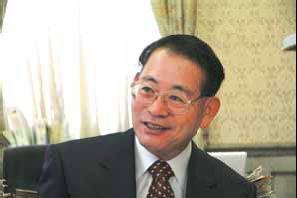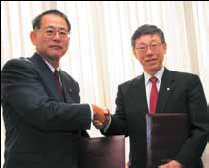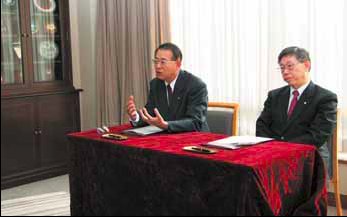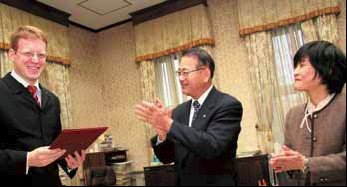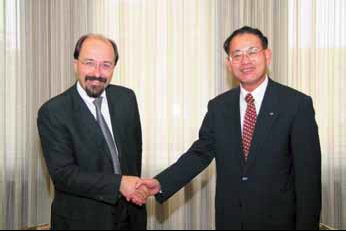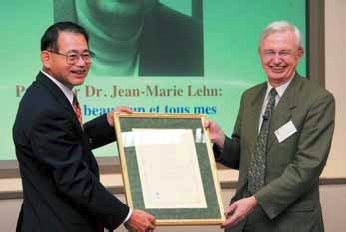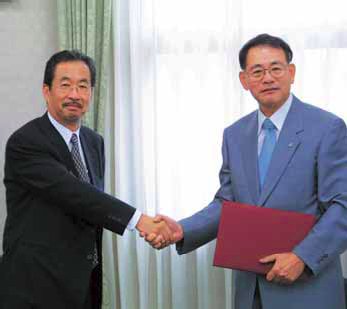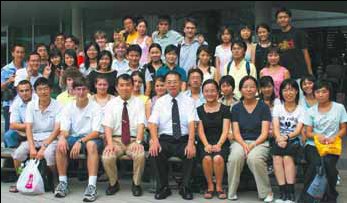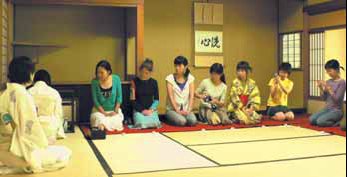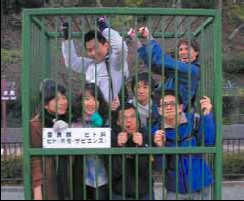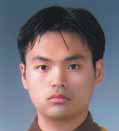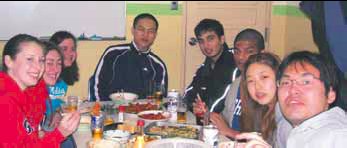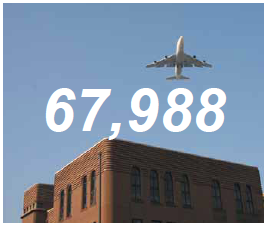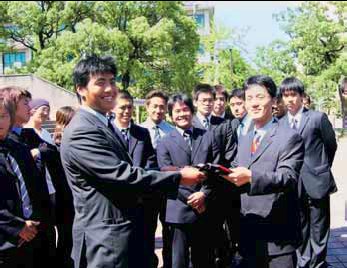| TOPICS |
|
Revolutionizing Kyushu University: On Wednesday, August 10, 2005, the Kyushu University Presidential Selection Council decided to name incumbent President Tisato Kajiyama as President-designate of Kyushu University for the next term of office. The term runs from November 7, 2005 to September 30, 2008 (without the possibility of reappointment). At the press conference after the selection, Mr. Michisada Kamata, Chairman of the Presidential Selection Council (Chairman, Board of Directors, Kyushu Electric Power Company, Inc.) gave the following reason for President Kajiyama's selection: "Following the University's incorporation, Kyushu University has launched various initiatives and is facing a major task in the relocation to the Ito Campus. It was concluded that President Kajiyama was the appropriate person to push forward with these innovations, based on his achievements to date, so that the university can make rapid progress in its future development."
Kyushu University and Waseda University sign "Basic Cooperative Agreement" On Wednesday, December 21, 2005, Kyushu University and Waseda University concluded a "Basic Cooperative Agreement," with the objective of enhancing the development of research and education at both universities. This agreement seeks to contribute to research, education, and cooperation between industry and academia and international exchanges, and to the mutual development of both universities. This is the first time that a comprehensive cooperative agreement has been concluded between a national and private university. At the press conference after the signing ceremony, Dr. Tisato Kajiyama (President, Kyushu University) expressed his desire stating, "Mutual exchanges between both universities in various fields of research and education will be facilitated through this agreement. I would like our universities to cooperate in ways never seen before." Dr. Katsuhiko Shirai, President of Waseda University (right), expressed his expectations, saying, "While competition with universities around the world is necessary, this type of cooperation will lead to the improvement of universities throughout Japan."
Oliver Schmitz won "The Itoh Project Prize" The Itoh Project Prize in Plasma Turbulence was established at the European Physical Society (EPS) Conference on Plasma Physics in the name of Kyushu University Professor Sanae Itoh (Research Institute for Applied Mechanics). The Prize was founded to select and reward a PhD student who has done outstanding research on plasma turbulence. The winner is invited to Kyushu University, and offered the chance to deliver a lecture or undertake joint research at the Universityfs state-of-the-art plasma research facilities. The international selection committee chose one winner for the 2005 Itoh Project Prize in Plasma Turbulence from among 29 candidates from all over the world. The winner was Oliver Schmitz from the Institute for Plasma Physics, Oliver Schmitz visited Kyushu University on February 16, 2006 and was awarded the prize by President Kajiyama and Professor Itoh. In a congratulatory speech to Mr. Schmitz, Professor Itoh said, gIt was very difficult to choose one winner from among the excellent and exceptionally high-level candidates from all over the world. I am very pleased that we can expect to see progress in plasma physics research. I look forward to seeing your work develop even further.h
Visit by the editor of The Economist On Wednesday, October 5, 2005, Bill Emmott, the editor of The Economist and author of such books on Japan as "The Sun Also Sets" made a courtesy visit to President Kajiyama and gave a lecture at the Hakozaki campus. In addition, from the evening, he attended a commemorative symposium entitled "The Future of Japan, The Future of Kyushu," and before an audience of approximately 350 people, discussed such topics as collaboration between industries and academia, local-to-local linkages at global level, and the declining birthrate and aging of society with Governor Aso of Fukuoka Prefecture, President Ishihara of JR Kyushu, and President Kajiyama of Kyushu University.
Honorary doctorate presented to Dr. Jean-Marie Lehn On Friday, October 7, 2005, Kyushu University bestowed an honorary doctorate on Dr. Jean-Marie Lehn (winner of the Nobel Prize in Chemistry in 1987) of the University Louis Pasteur in France. Dr. Lehn is renowned for research related to the concept of supramolecular chemistry, and for over 30 years has conducted joint research with chemistry labs at Kyushu university, as well as providing guidance to Kyushu University graduate students. Dr. Lehn gave a lecture after the ceremony and expressed his hearty encouragement to the audience with these words - "Science knows no borders. I have great expectations of your activities on the international stage in the future."
Cooperative Agreement Concluded with the Japan Bank for International Cooperation (JBIC) On Thursday, June 30, 2005, Kyushu University welcomed Mr. Tango from the Japan Bank for International Cooperation (JBIC), a government-affiliated financial institution and concluded an agreement on overseas economic cooperation. This agreement demonstrates the intention of Kyushu University, which has declared its desire to contribute internationally based on its "Focusing on Asia" policy, and JBIC, which actively promotes the practical application of knowledge and experience of universities. JBIC provides support to developing countries through yenbased loans that constitute one of the main tools for Official Development Assistance (ODA). This is the first time that a cooperative agreement has been concluded between this university and a development assistance organization providing support to developing countries. Through the conclusion of this agreement, it is expected that solutions will be offered to various critical issues concerning overseas cooperation in Asia and other parts of the world, through the use of human resources, and education and research, which has been accumulated by Kyushu University to date, for yen-based loan activities overseas, while also taking the practical experience garnered by JBIC in developing countries and incorporating it into the university's education and research. In China, for example, every year there are over 6,000 deaths in coal mining accidents and environmental problems arising from mining have become increasingly serious. Through cooperation with JBIC, in 2006, Kyushu University will organize human resource training courses in order to develop human resources that can address safety and environmental issues in the coal mining industry in China. This fiscal year, preliminary surveys will be carried out to develop these activities for the following year. In addition, the university will be dispatching students to JBIC as interns, in order to develop human resources that can conduct and lead aid activities in developing countries in the future, and thereby contribute to international society.
Asia in Today's World (ATW) - Summer Program History of ATW The Kyushu University Summer Program was launched in 2001 with the backup of the Ministry of Education, Culture, Sports, Science and Technology and the University Mobility in Asia and the Pacific (UMAP), the international educational organization in the Asia and Pacific region. The program was originally named as the UMAP Leaders Program. This was the first summer program specifically for international students instigated by a Japanese national university. A major goal of the UMAP Leaders Program was to enhance student exchange between UMAP member countries/territories by developing a new credits transfer scheme, with the aim of educating young people in Asia-Pacific to be future leaders in this region. The UMAP Leaders Program finished in 2002 with an excellent reputation amongst participants and with their home universities. In 2003, we relaunched the program as an independent summer program and renamed it "Asia in Today's World (ATW)." ATW welcomes international students, with an academic ambition of acquiring understanding and knowledge of Asia, from any part of the world. Participants from prestigious universities For the last 5 years since inauguration of the program, 154 students from 38 universities, all of which are the most prestigious universities in each country, participated in the program. Please visit our website (see below) for the list of the universities. ATW -A program with an innovative structure ATW is for both undergraduate and graduate students in any major. Two tracks are available: Humanities & Social Sciences or Natural Sciences, and students can choose either of the tracks according to their interest or major. Focusing on Asia, one of the most dynamic regions in today's world, ATW offers undergraduate level Asian Studies courses in the Humanities & Social Science Track. By looking at globalization, which has been rapidly advancing in Asia, the Asian Studies courses are designed to offer the valuable opportunities for participating students to study international relationships not only between Japan and the Asia, but also between Asia and the world. All courses are lectured by Kyushu University professors and professors invited from prestigious universities around the world. The Natural Science track offers a laboratory work course, and students can do research and experiments at a laboratory with Kyushu University graduate students. English guidance by a Kyushu University professor is available for the laboratory work course.
Study trips to experience Japanese culture Several study trips were held during the program; Itsukushima Shinto Shrine and Peace Memorial Park in Hiroshima, a farming work experience in Nishi-arita, joining a tea ceremony gathering at a Japanese garden and a tour to a professional baseball game. Each excursion was planned in the expectation that students were able to experience some part of Japanese culture and the Japanese aesthetic sense.
Variety of accommodation ATW prepares two types of accommodation; a furnished apartment for the first three weeks and home stay with local families for the second three weeks. While staying in an apartment, students have plenty of time to share with friends. Later they can experience the real life of Japanese people during the home stay. Full term home stay is available if the host family agrees. Also, full term apartment stay is possible if students prefer. Creating Friendship with Kyushu students ATW organizes a peer tutor group of Kyushu University students to assist each ATW student one by one during the period of the program. Peer tutors will help ATW students to enjoy their stay in Fukuoka, showing them around the campus and guiding them to the city, and become a close friend of ATW students. The friendship between former ATW students and peer tutors has often lasted even after the program. ATW for the year 2006 ATW will convene from 3 July to 11 August 2006, hosting about 60 students. Asian Studies courses will be offered as follows:
It's time for the 6th Conference of Asian University Presidents (CAPS)! The venue and theme of the 6th Conference of Asian University Presidents have been chosen. Details on the date, the agenda and participating universities will be formally announced by Shanghai Jiao Tong University, this year's host institute, at a later date.
What is the CAPs? The Conference of Asian University Presidents (CAPs) was inaugurated by Kyushu University, with the express intent of formalizing dialogue amongst Asian universities on the significance of Asia in a globalizing world, of establishing a cooperative network of universities that can contribute to the development of the Asian region in the 21st Century, and of affirming the importance of Asia to Kyushu University. The Conference was hosted by Kyushu University in 2000 and 2001, by Pusan National University in 2002, and by Chulalongkorn University with the cooperation of Mahidol University and Thammasat University in 2003, and again by Kyushu University in 2004. At the 5th Conference in 2004, 26 influential universities were represented, at which substantial discussions were carried out on gjoint curriculah and gdevelopment of young researcher training programs in Asian universities,h together with the organization of meetings by high school and college students, who are the leaders in the gAsian Century.h
Understand Kyushu University through "Numbers"
67,988 times. That is the number of planes that landed at Fukuoka Airport in 2004. When added the number of planes that departed from Fukuoka Airport, that figure becomes well over 130,000, which is only next to Haneda and Narita airports. Most planes that land at or take off Fukuoka Airport fly directly over Kyushu University. Fukuoka Airport has 25 domestic routes and 24 international routes (as of December 2005) and the number of passengers exceeds 18.56 million over the span of one year (2004). The frequency of take-offs and landings on a runway is the most numerous in Japan. The appearance of airplanes that fly low directly over Kyushu University has given a very strong impression to Kyudai-jin.
Commemoration Events for the 80th Anniversary of the Kyushu University Rugby Football Club Kohnosuke Sato The Kyushu University Rugby Football Club, established in 1925, celebrated its 80th Anniversary last year. This long continuation of the clubfs activity leading up to today is due to the efforts of both the Clubfs Old Boys Association and each yearfs members, whom I would like to express appreciation to and congratulate. On May 28-29, 2005, the memorial events were performed in order to celebrate the 80th anniversary. On the afternoon of May 28, tri-lateral rugby football games were carried out by the Old Boys from the Tokyo/Kanto and Osaka/Kansai areas together with the Old Boys in the Fukuoka/Kyushu area. Those games brought back memories of hot days long past for each of the members. On the evening of May 28, the ceremony and celebration party were held, where President Kajiyama, Vice President Yanagihara, and other officials from Kyushu University were in attendance, along with dignitaries from the Japan Rugby Football Union, the Rugby Football Clubs of the University of Tokyo and Kyoto University, and the Rugby Football Clubs of the Kyushu area. More than 200 persons attended the event; as President Kajiyama gave an impressive celebration speech, putting an emphasis on sports club activities in the university by focusing on the gimportance of sweating.h On the second day, May 29, a memorial game was held at the Sawayaka Sports Field with the invited rugby football club from Pusan University. It was quite a nice game and the result was Kyushu Univ. 34 vs Pusan Univ. 19 (1st : 19-7, 2nd 15-12). After the game, a welcome reception was held in the university campus, and members of both teams had a good time, which led to deeper mutual understanding between one another. Pusan Universityfs head coach, Mr. Cho, said, gWe enjoyed todayfs nice game, and also sincerely hope to have the second game at Pusan University next year; wishing to make this activity of rugby football exchange a continuous one.h The same impression was shared by the Kyushu University side too. We think this sort of activity will enhance mutual understanding between the two countries in the form of gsmall but bigh civilian envoys.
|
Previous PageTop Next
